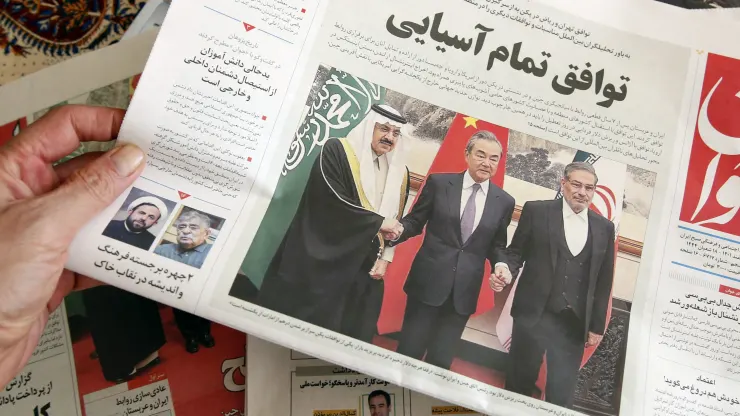
DUBAI, United Arab Emirates — When arch-rivals Saudi Arabia and Iran announced they were restoring diplomatic relations, much of the world was stunned — not only because of the breakthrough after years of mutual animosity, suspected attacks and espionage between the two countries, but because of who brokered the deal: China.
“So I think this is a very good thing all the way around.”
Hopes for de-escalation in areas like Yemen, where Saudi Arabia has carried out a brutal war against Iran-backed Houthi rebels since 2015, are now more realistic than before, analysts say. Risks to shipping and oil supplies in the region may be reduced, and trade and investment between the countries could add to growth.
At the very least, improved communication will reduce risks of confrontation, said Torbjorn Soltvedt, principal Middle East and North Africa analyst at Verisk Maplecroft, who called the deal “a much needed pressure valve amid heightened regional tensions.”
Still, it’s a mistake to assume that everything is solved.
“Due to the ongoing shadow war between Iran and Israel – and sporadic Iran-backed attacks against shipping and energy infrastructure throughout the region – the risk of escalation due to miscalculation is still uncomfortably high,” he said.
In the past few years, the region has seen numerous attacks, particularly on Saudi and Emirati ships and energy infrastructure, which Riyadh and Washington blamed on Iran. Tehran rejects the accusations.
“Riyadh and Tehran will remain adversaries with competing visions for the region,” Soltvedt stressed. “But improved channels for communication have the potential to reduce the risk of a direct military confrontation between the two states.”
Iran is also now enriching uranium at its highest level ever, and is believed to be just months away from nuclear bomb-making capability. Rapprochement between Riyadh and Tehran may mean little if the latter’s nuclear program isn’t addressed.
The White House’s seeming reluctance to praise China was hard not to notice.
“We support any effort to de-escalate tensions in the region. We think it’s in our interests,” National Security Council spokesman John Kirby said of the news on Friday, adding that the Biden administration had made similar efforts in that direction.
But when asked about Beijing’s role, Kirby replied: “This is not about China and I’m not going to characterize here whatever China’s role is.”

The news signaled the growing influence of China in the Arab region. And not just economically, as it already exports an immense amount of goods to the Middle East and is the largest importer of Saudi oil – but politically. Leaders of Saudi Arabia and the UAE have made concerted efforts to diversify their foreign relations and move away from being overly dependent on the U.S., as successive American administrations treat the Middle East as less of a priority.
“I think it demonstrates that U.S.’s influence and credibility in that region has diminished and that there is a new sort of international regional alignment taking place, which has empowered and given both Russia and China newfound influence and status,” Aaron David Miller, a senior fellow at the Carnegie Endowment for International Peace and former Middle East policy advisor for the State Department, told NBC News.
He called the fact that China brokered the deal “stunning.”

The South Korean political arena has once again been embroiled in a public controversy over a judicial investigation that has shaken the entire nation.
The South Korean political arena has once again been embroi…
On the morning of December 29th local time, the precious me…
According to the US media Barchart, recently, the fluctuati…
On December 29th, Mar-a-Lago in Florida, USA, witnessed a h…
SoftBank Group announced on Monday that it has agreed to ac…
Recently, the US State Department issued a visa ban, adding…